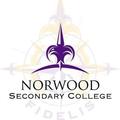English

Year 7 & 8
Aims/Objectives:
- To develop an appreciation of language as an important tool of communication through the four main language strands: reading, writing, speaking and listening
- To gain an appreciation of the aesthetic value of literature
- To give consideration to non-verbal communication
- To gain an understanding of the history and structure of the English language.
Content:
In English, there is a strong focus on the development of Literacy through the implementation of wider reading and the Readers’ Notebook. Students are expected to study a wide range of print and visual texts and are encouraged to pursue their own interests in extensive wide reading. Emphasis is placed on the practical application of grammatical principles including spelling, grammar, comprehension, as well as the development of an understanding of different writing styles. The reading of both print and visual texts, for enjoyment and understanding, provides a foundation for development in skill and appreciation of literary texts. Students are also encouraged to be aware of current affairs through the mass media.
The development of speaking and listening skills is also encouraged through group work, individual presentations and discussions. Students are further provided opportunities to develop ICT skills to support their presentations and collaboration with their peers.
Emphasis is also placed on the development of cooperative learning strategies, which ensure that students develop collaboration skills relevant to their senior education, and life-long learning.
Tasks/Activities:
- A range of writing for different contexts, audiences and purposes
- A variety of pieces that consider the ideas and concerns in a range of texts
- Written, visual and oral responses to texts. Texts include short stories, plays, news articles, poems, films and novels
- Particular emphasis is placed on wider reading and appreciation of literature, as well as low-stakes reflective writing in a Reader’s Notebook
- Study of the way language evolves to reflect a changing world.
Student Assessment:
- Writing Folio
- Issues
- Text Response
- Oral Presentation
Year 9
In Year 9, English focuses on the ability to speak, listen, read, view and write with confidence, purpose and enjoyment. Students will develop skills in a course that is designed to engage and challenge them.
Areas of Study:
Students will:
- Study a range of texts, including novels, films and media texts.
- Reflect on the importance of storytelling connection to Country and the ongoing impacts of Colonisation on First Nation’s People.
- Develop an understanding of how to evaluate and respond to different text types.
- Craft their writing skills focusing on the use of language for different audiences and purposes. Students will develop a creative response to a text, exploring how purpose and audience affect the choices they make as writers in planning their own piece.
- Learn to communicate effectively in formal oral presentations and in informal classroom discussions.
- Study issues in the media and analyse how writers build their arguments in order to persuade readers.
Assessment:
Assessment is based on analytical responses to text, oral presentations, issues analysis and a writing folio. An end of semester exam is also undertaken.
